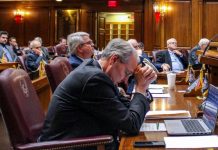Dave Stafford for www.theindianalawyer.com
Grandparents rightly were awarded visitation with their granddaughter after their daughter died, but the Court of Appeals ruled Tuesday a trial court abused its discretion in establishing the amount of time grandparents could spend with the child.
The grandparents of L.W. sought and received a visitation order after their daughter died following a long battle with cancer. She had primary custody of L.W. after divorcing the girl’s father, R.W., a short time earlier.
Judge Rudolph R. Pyle III wrote for the panel that the court didn’t err in granting grandparents visitation over father’s objection. The court gave father’s decisions regarding visitation special weight, didn’t misrepresent the amount of visitation he had allowed grandparents, and properly found grandparents had rebutted the presumption in favor of a fit parent’s decisions regarding grandparent visitation.
“However, we agree that the trial court abused its discretion in the amount of visitation it awarded Grandparents, and we remand to the trial court to amend the amount of visitation awarded,†Pyle wrote for the panel.
The trial court ordered that Grandparents receive structured and unsupervised visitation: one overnight on one weekend during even-numbered months; two overnights on one weekend during odd-numbered months; every Tuesday during the school year until 7 p.m. and during the summer from 10 a.m. to 7 p.m.; eight hours on Mother’s birthday; four hours on Grandparents’ birthdays; one overnight during the week of L.W.’s birthday; and five consecutive days during the summer.
“This amount totals approximately seventy-nine days per year, which is higher than the amount we found was an abuse of discretion†in Swartz v. Swartz, 720 N.E.2d 1219, 1221 (Ind. Ct. App. 1999), Pyle wrote. “It is also very similar to the parenting time schedule a non-custodial parent would have.â€
The panel remanded to the trial court to establish a visitation schedule that allows grandparents “occasional, temporary visitation that does not substantially infringe on†father’s right to control L.W.’s “upbringing, education, and religious training,†citing the language of Visitation of M.L.B., 983 N.E.2d 583, 587 (Ind. 2013).
The case is In Re the Visitation of L-A.D.W; R.W. v. M.D. and W.D., 82A01-1402-DR-82.




